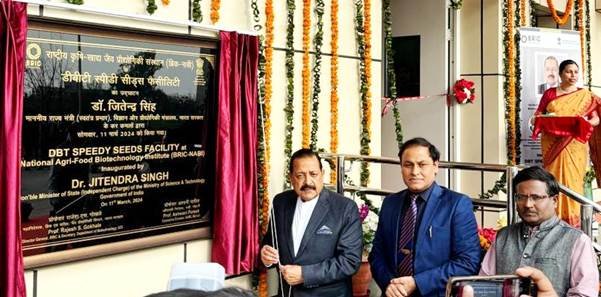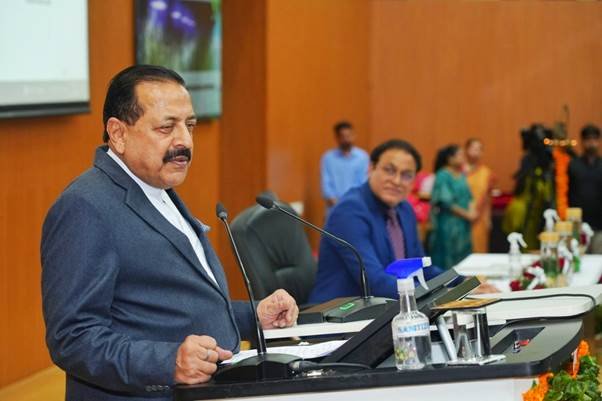Union Minister Inaugurates National Speed Breeding Crop Facility at NABI
The Union Minister for Agriculture recently inaugurated the National Speed Breeding Crop Facility at the National Agri-Food Biotechnology Institute (NABI), marking a significant leap in agricultural research and innovation. This state-of-the-art facility aims to revolutionize crop breeding methodologies, enhancing productivity and sustainability in the agricultural sector.
Speed breeding is a revolutionary technique that accelerates the breeding cycle of crops, enabling the development of new varieties in a fraction of the time required through traditional methods. By harnessing controlled environments and advanced technology, researchers can expedite the growth and reproduction of plants, facilitating rapid genetic improvements to address emerging challenges such as climate change, pest infestations, and food security concerns.
The establishment of the National Speed Breeding Crop Facility is a testament to the government’s commitment to bolstering agricultural productivity and resilience. With the looming threat of climate change and its adverse impacts on crop yields, innovative approaches like speed breeding offer a ray of hope for farmers grappling with uncertain climatic conditions and evolving pest pressures. By leveraging cutting-edge biotechnology, researchers can develop climate-resilient crop varieties capable of thriving in diverse agro-climatic zones, thus ensuring food security and sustainability.
Furthermore, the inauguration of this facility underscores the importance of collaborative research initiatives between academia, industry, and government agencies in driving agricultural innovation. By fostering partnerships and knowledge exchange, stakeholders can pool their expertise and resources to tackle complex agricultural challenges and translate scientific breakthroughs into tangible benefits for farmers and consumers alike.
Ultimately, the advent of speed breeding technology holds immense promise for empowering farmers and enhancing livelihoods across the agricultural value chain. By equipping farmers with resilient crop varieties tailored to local environmental conditions, we can mitigate risks, increase yields, and improve farm incomes. Moreover, the adoption of advanced breeding techniques can foster sustainability by reducing the reliance on chemical inputs and promoting eco-friendly farming practices.

Why this News is important
Addressing Agricultural Challenges:
The inauguration of the National Speed Breeding Crop Facility holds immense significance as it represents a paradigm shift in agricultural research and innovation. By accelerating the breeding cycle of crops, this state-of-the-art facility enables researchers to develop climate-resilient varieties capable of withstanding environmental stresses and pest pressures, thus ensuring food security and sustainability in the face of emerging challenges.
Fostering Technological Innovation:
Moreover, the adoption of speed breeding technology underscores the government’s commitment to fostering technological innovation in agriculture. By investing in advanced breeding methodologies and research infrastructure, policymakers aim to catalyze transformative changes in the agricultural sector, driving productivity gains, enhancing farmer livelihoods, and promoting sustainable development.
Strengthening Collaborative Partnerships:
Furthermore, the inauguration of this facility underscores the importance of collaborative partnerships between academia, industry, and government agencies in addressing complex agricultural challenges. By leveraging collective expertise and resources, stakeholders can accelerate the pace of scientific discovery, translating research findings into actionable solutions that benefit farmers, consumers, and the environment.
Promoting Sustainable Agriculture:
The establishment of the National Speed Breeding Crop Facility aligns with the government’s vision of promoting sustainable agriculture and environmental stewardship. By developing resilient crop varieties adapted to changing climatic conditions, researchers can minimize the ecological footprint of farming operations, reducing reliance on chemical inputs and mitigating environmental degradation.
Empowering Farmers:
Ultimately, the advent of speed breeding technology empowers farmers by equipping them with cutting-edge tools and knowledge to enhance productivity, resilience, and profitability. By providing farmers with access to improved crop varieties tailored to local agro-climatic conditions, we can unlock the full potential of agriculture as a driver of economic growth and rural development.
Historical Context
The inauguration of the National Speed Breeding Crop Facility builds upon decades of research and technological advancements in crop breeding methodologies. Historically, traditional breeding methods have relied on cross-pollination and selection over multiple generations to develop new crop varieties, a process that often spans several years or even decades. However, the advent of speed breeding technology has revolutionized this paradigm by dramatically shortening the breeding cycle, enabling researchers to achieve in months what previously took years to accomplish.
Moreover, the development of speed breeding techniques is closely linked to the emergence of biotechnology and genomics in agriculture. With the mapping of the plant genome and the advent of gene editing technologies such as CRISPR-Cas9, researchers gained unprecedented insights into the genetic basis of crop traits, facilitating targeted breeding efforts to improve yield, quality, and resilience.
The establishment of the National Speed Breeding Crop Facility reflects the government’s recognition of the critical role of technological innovation in addressing pressing agricultural challenges. Over the years, policymakers have prioritized investments in research and development infrastructure, fostering collaborations between public and private sectors to drive agricultural innovation and enhance global competitiveness.
5 Key Takeaways from “Union Minister Inaugurates National Speed Breeding Crop Facility at NABI”
| Serial Number | Key Takeaway |
|---|---|
| 1. | Speed breeding technology accelerates crop breeding cycles. |
| 2. | The facility aims to develop climate-resilient crop varieties. |
| 3. | Collaboration between academia, industry, and government is crucial for agricultural innovation. |
| 4. | Speed breeding empowers farmers with resilient crop varieties. |
| 5. | The initiative aligns with the government’s vision of promoting sustainable agriculture and enhancing farmer livelihoods. |
Important FAQs for Students from this News
1. What is speed breeding technology?
A: Speed breeding technology is a revolutionary technique that accelerates the breeding cycle of crops, enabling the development of new varieties in a fraction of the time required through traditional methods. By harnessing controlled environments and advanced technology, researchers can expedite the growth and reproduction of plants, facilitating rapid genetic improvements to address emerging challenges such as climate change, pest infestations, and food security concerns.
2. How does speed breeding contribute to agricultural productivity?
A: Speed breeding contributes to agricultural productivity by enabling the rapid development of climate-resilient crop varieties that can withstand environmental stresses and pest pressures. By shortening the breeding cycle and facilitating the creation of new varieties adapted to local agro-climatic conditions, speed breeding helps farmers increase yields, mitigate risks, and improve farm incomes.
3. What are the benefits of collaborative research initiatives in agriculture?
A: Collaborative research initiatives in agriculture bring together stakeholders from academia, industry, and government agencies to pool their expertise and resources in addressing complex agricultural challenges. By fostering partnerships and knowledge exchange, collaborative research initiatives accelerate scientific discovery, translate research findings into actionable solutions, and promote innovation in the agricultural sector.
4. How does the establishment of the National Speed Breeding Crop Facility empower farmers?
A: The establishment of the National Speed Breeding Crop Facility empowers farmers by providing them with access to cutting-edge breeding technologies and resilient crop varieties. By equipping farmers with improved varieties tailored to local environmental conditions, speed breeding enhances productivity, resilience, and profitability, thereby improving farmer livelihoods and promoting sustainable agriculture.
5. What is the significance of the government’s investment in agricultural innovation?
A: The government’s investment in agricultural innovation underscores its commitment to addressing pressing agricultural challenges and promoting sustainable development. By prioritizing investments in research and development infrastructure, policymakers aim to drive technological innovation, enhance global competitiveness, and ensure food security and environmental sustainability for future generations.
Some Important Current Affairs Links


















 Exciting News!
Exciting News!  Join Our Telegram Channel Now!
Join Our Telegram Channel Now!
 Join our Telegram channel for a thrilling adventure into the world of daily current affairs.
Join our Telegram channel for a thrilling adventure into the world of daily current affairs. 
 Don’t miss out on the latest updates and insights! Click to join now and be part of the knowledge revolution!
Don’t miss out on the latest updates and insights! Click to join now and be part of the knowledge revolution! 
